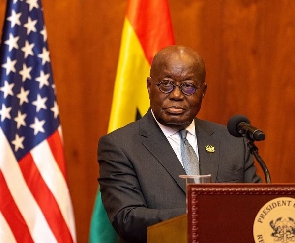 President Nana Addo Dankwa Akufo-Addo
President Nana Addo Dankwa Akufo-Addo
In October 2022, Ghana sought the IMF (International Monetary Fund) bailout for the record 17th time. Actually, very few people anticipated that Ghana, which until recently was considered Africa's brightest star, would experience this level of financial catastrophe in such a short time.
Even in 2019, Ghana's Economy was expanding at the fastest rate in the world. The World Bank and the International Monetary Fund (IMF) were optimistic about the steady rise of the nation. Although Ghana's Economy is primarily driven by oil, non-oil industries like agriculture, manufacturing, and services were also expanding quickly. Everything was going well until the outbreak of Covid pandemic.
And today, Ghana, the economic poster boy of West Africa, is on the verge of entering into a full-blown economic recession. Despite being a significant exporter of cocoa and gold, it is presently experiencing its worst financial crisis in decades.
The Inflation rose from 13.9% in January to 37.2% in September, the highest level in 21 years. Some analysts believe the actual level is more than twice the official rate, around 98%. Petrol and diesel prices have jumped by 88.6% and 128.6%, respectively. Most public transport fares have increased by over 100% since January.
Initially, the government was hopeful that the Economy would recover after the pandemic. Ghana's economic revival, however, got a severe jolt from Russia's conflict in Ukraine. Between January and October 2022, the cedi, the country's currency, lost more than 50 percent of its worth, increasing Ghana's debt by $6 billion.
The President recently acknowledged to the nation that Ghana is indeed in trouble. He attributed the predicament to external factors, including the pandemic and the Russia-Ukraine conflict.
Today, thousands of young people are angry and frustrated with the once-popular President, blaming him for the unaffordable cost of living and the exorbitant rise in fuel and food prices. But the President of the Republic, Nana Addo Dankwa Akufo-Addo refuses to give up.
The Akufo administration is aware that the key to finding a solution is to increase tax income by promoting economic development, which should involve more foreign private investment. Even on March 2023, his government commissioned the expanded GB Foods Factory in Tema with the pledge to continue unleashing the innovative, entrepreneurial instincts of the Ghanaian private sector to drive rapid growth and create jobs.
Indeed, Agriculture contributes more than 40 percent of Ghana's export revenue and represents 21 percent of the country's GDP. At the same time, it supplies more than 90 percent of the nation's food requirements. And the revival of the agriculture sector is primordial to boost the Economy, generate jobs, and reduce food insecurity.
The government understands the importance of the agriculture sector for reviving the Economy. In fact, very early in his tenure, the Akufo administration introduced the One District One Factory (1D1F) development plan to attract value-added investment to the agricultural industry.
The program called for creating an industrial zone in each of Ghana's ten provinces and one new factory in the country's 216 districts. According to the project, each district was expected to generate about 6,000 direct employees.
The 1D1F initiative and other pro-business policies were intended to increase export-related manufacturing and FDI for its industrial infrastructure.
While the success of the 1D1F plan is crucial for revitalizing the agriculture sector and overall Economy, the foreign investors are still cautious and want the government to do more to ensure their investment is safe.
Given the circumstances, the 1D1F plan needs to be amended and revitalized as Ghana seeks to advance technical advancements and engage more young people in sustaining and enhancing the nation's economic performance. As his regime desperately scrambles to inject much-needed impetus to galvanize the beleaguered Economy, he can draw some inspiration from India, especially from the policies of the state of Uttar Pradesh.
Similar to 1D1F, the Uttar Pradesh state administration introduced the "One District One Product (ODOP)" programme in 2018. ODOP was viewed as a crucial initiative as the government of UP aimed to increase the state's Economy to $1 trillion and increase its share of India's GDP from 8% to 15-16%.
The overall goal of ODOP was to stimulate regional growth by utilizing local talent, resources, and expertise. Modeled after the Japanese "One Village One Product" programme of the 1980s, the ODOP sought to revitalize the Economy by fostering regional development through local resources, talent, and knowledge.
Ghana is grappling with issues that Uttar Pradesh addressed a few years back.
Despite a few drawbacks of the Indian ODOP, Ghana can still replicate the positive aspects of the Indian experience. The ODOP could serve as a model for 1D1F and assist Ghana in its economic revival. Like the ODOP programme, Ghana's 1D1F programme can be more successful if it prioritizes value chain development, product marketing support, financial aid, and skill development.
In Ghana, there is a lack of convergence of these four crucial components. The country of West Africa may also emulate UP's systematic participation of institutions from both the public and private sectors at all levels.
Clearly, another bailout won't resolve the financial crisis of Ghana. The Akufo administration knows very well that the long-term solution to this crisis is to increase investments instead of focusing only on fiscal discipline. Time is of the essence, as only the success of 1D1F will determine the dream of a return to power for the current President as well as set the course for the future of Ghana.